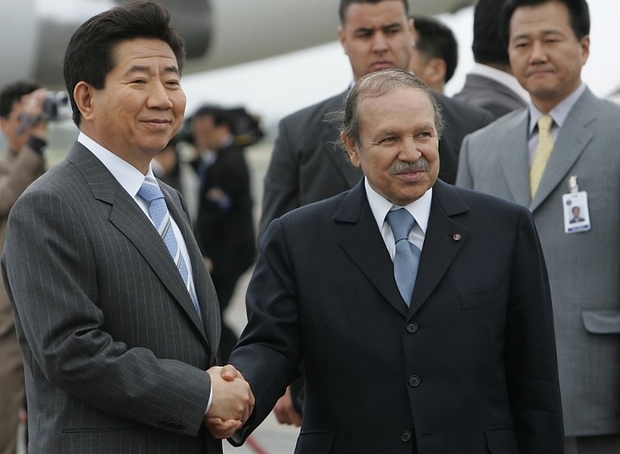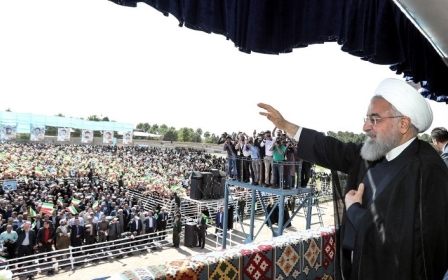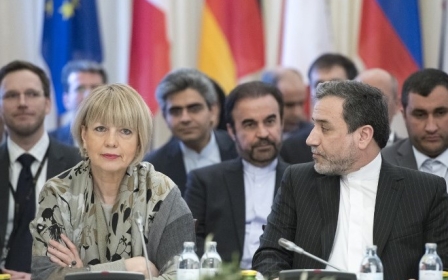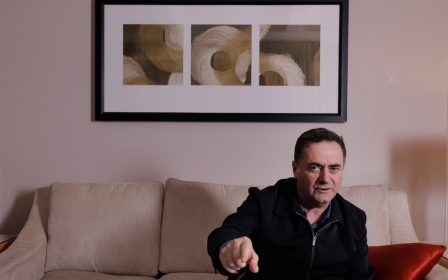EXCLUSIVE: Algeria hosted meeting between North Korean and South Korean officials

ALGIERS - Algeria has hosted delegates from North Korea and South Korea as part of a thaw in relations between the two longstanding enemies, Middle East Eye can reveal.
South Korea's ambassador to Algeria, Park Sang Jin, invited his North Korean counterpart Choi Hyuk Chul to his home in Algiers on 1 May. No information on the meeting has been made public, MEE understands.
Algeria previously offered to mediate last September, when tensions between North Korean leader Kim Yong-un and US President Donald Trump led to fears of a military confrontation over Pyongyang's nuclear and ballistic programmes.
In April, Kim Jong-un becoming the first leader of the isolated state to go to South Korea since the de facto end of the Korean War in 1953. A peace treaty has never been signed.
The north has also taken diplomatic steps, including re-joining South Korea's time zone and submitting a proposal to the International Civil Aviation Organisation (ICAO) to open an air corridor to South Korea.
North Korea and the Arab world
Relations between the Korean peninsula and the Arab world date back to the creation of the Non-Aligned Movement in 1961.
Cairo and Algiers are the only two Arab capitals to host diplomatic representation of both Koreas, although Yemen maintained relations before the outbreak of the three-year war in 2015.
During the 1990s, when Algeria was under an arms blockade as a result of the then-civil war, Pyongyang trained hundreds of soldiers in advanced combat techniques and provided weapons for the fight against armed groups.
Algeria has long refused to break ties with North Korea, although it has discreetly applied economic sanctions and established a moratorium on professional visas granted to North Korean workers, who are highly prized on oil works and public works.
According to an Algerian security source contacted by MEE, instructions have been given to the gendarmerie and police to carry out identity checks on construction sites to ensure that there are no North Korean workers carrying fake Chinese papers.
The economic benefit
The rapprochement between the two Koreas gives Algiers the opportunity to capitalise by making itself a hub for South Korean investments in the MENA region. It would also open an export and investment market in North Korea.
In addition, once sanctions are lifted, North Korea would be able to resume its conventional arms exports and potentially partner with the South Korean arms industry, which has become increasingly dynamic in recent years.
For its part, South Korea has spent two decades trying to strengthen diplomatic relations with the Arab world. Since the late 1970s, trade has increased with the establishment of chaebols (South Korean economic conglomerates) in the region.
Relations between Seoul and Algiers only began in January 1990, but the decision benefited Algeria, then mired in an economic and political crisis. South Korean companies were the first to invest in automobile and electronics distribution and to establish contracts with Algerian companies.
New trade ties were marred in October 1994 by the assassination of the general manager of the Daewoo group in Algeria. The crime was never solved, but was attributed to an armed group.
This report originally appeared on Middle East Eye's French site.
New MEE newsletter: Jerusalem Dispatch
Sign up to get the latest insights and analysis on Israel-Palestine, alongside Turkey Unpacked and other MEE newsletters
Middle East Eye delivers independent and unrivalled coverage and analysis of the Middle East, North Africa and beyond. To learn more about republishing this content and the associated fees, please fill out this form. More about MEE can be found here.





